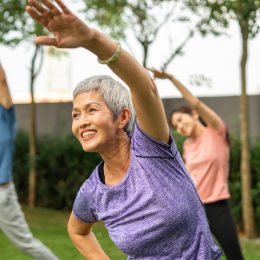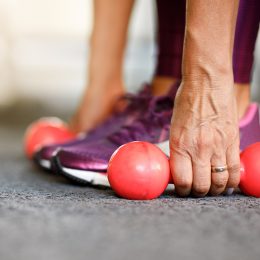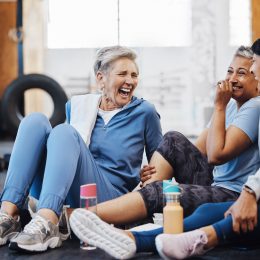The #1 Exercise for Fixing Your Posture
Stand taller, prevent injuries, and alleviate neck and back pain with this essential movement from fitness expert David Jack.
Gravity cannot be deterred. It’s always with us, trying its best to pull our shoulders forward until our entire upper body collapses toward the floor. This not only affects our posture, and causes neck and back pain, but it also limits proper breathing and increases the risk of trips and falls.
That’s why pulling exercises—moves that involve bringing an object toward your body—are important for our overall health and longevity, says fitness expert David Jack.
“Pulling exercises are the antidote to what’s happening in everyday life,” Jack says. “These movements strengthen the back of your body to promote better posture, and better posture gives us more energy, more access to life, and helps prevent falls and injuries,” he says. “It also makes us stand taller, so we look and feel good.”
There are a few different ways to perform pulling exercises (more on that below), but they all involve the same basic technique. Follow this guide to pull like a pro.
Remember: The movements here may be different or more advanced than those you’ll experience in a SilverSneakers class. If you have a chronic condition, balance issues, or an injury, talk to your doctor about how you can exercise safely. And if you ever feel too tired or that you can’t do a move and keep the right form, pause for a moment to check in with your body. Only keep going if you feel you can do so safely.
Step #1: Set Up Your Equipment
You can use resistance bands, tubing, or cable machines to do pulling exercises. At home, you could even use a pair of old pantyhose. Make sure the equipment is anchored safely at about the same height as the bottom of your rib cage.
Step #2: Steady Yourself
Facing the anchor point and holding the bands or handles in each hand, stand tall with your feet hip-width apart. Maintain this posture throughout the movement.
Step #3: Pull
Keeping your shoulders down and back (not near your ears), and your wrists neutral or straight (no curving in), pull your hands toward your rib cage without arching your back. As you do this, think about pulling your shoulder blades together as if you’re cracking an egg between them.
Step #4: Reverse the Movement
Extend your arms back out with control. You should feel this in your back and biceps.
Step #5: Make It Your Own
To make pulling exercises easier, perform them while sitting in a chair, keeping your chest tall and shoulders down.
Subscribe to our newsletter
It's quick and easy. You could be one of the 13 million people who are eligible.
Already a member? Click to discover our 15,000+ participating locations.
Follow Us
To make them harder, add more resistance or weight, do more total reps, or move slower so that your muscles are under tension longer. You can also:
Change your grip: By changing the position of your hands, you can target different muscles. For example, pulling with your palms facing each other works the posterior and medial deltoids (shoulder muscles), while pulling with your palms facing up hits your biceps more. You can stick to the same grip for six to eight weeks, then change it, or try using a different grip each day you do this exercise.
Pull from different directions: Exercises like the seated row are horizontal pulls, while exercises such as the lat pulldown are vertical pulls. They work different muscles, so be sure to incorporate both kinds of pulling exercises into your fitness routine.
Check Your SilverSneakers Eligibility Instantly
SilverSneakers members can go to thousands of gyms and fitness locations across the nation, plus take exercise classes designed for seniors and led by supportive instructors. If you have a Medicare Plan, it may include SilverSneakers—at no additional cost. Check your eligibility instantly here.
Already a member? Get your SilverSneakers member ID and exclusive fitness content by logging in to or creating your online account here.





